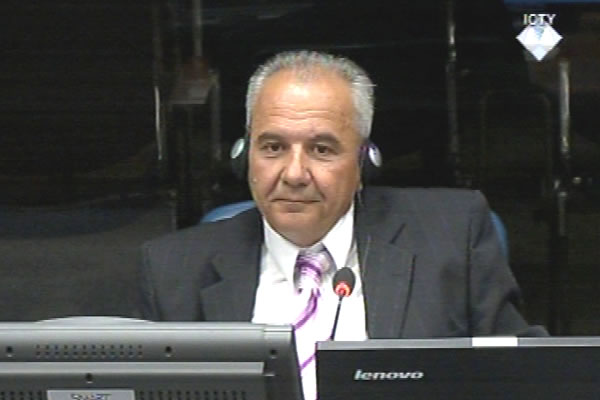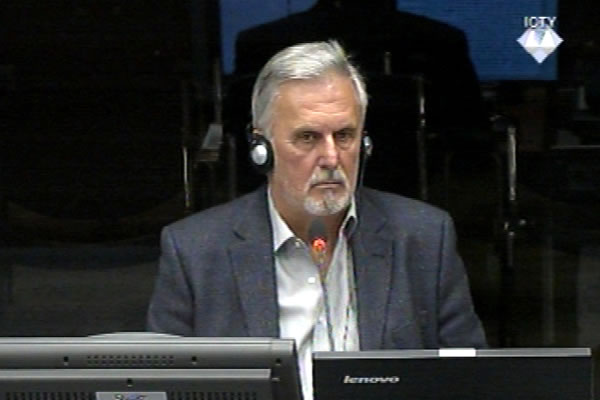Home
CONTRADICTORY EVIDENCE ON SARAJEVO ‘RANDOM’ BOMBS
In two days, two of Ratko Mladic’s defense witnesses made contradictory claims about modified air bombs. The Bosnian Serb Army used the projectiles also known as ‘sows’ or ‘random’ bombs in the attacks on Sarajevo. One witness claimed that the weapon was ‘wholly inaccurate’ and untested, which is why it was not used to target urban areas. The other witness said that modified air bombs were accurate and had undergone tests before being used. This witness personally ordered three attacks on various buildings in the city
 Stevan Veljovic, defence witness at Rako Mladic trial
Stevan Veljovic, defence witness at Rako Mladic trial In his evidence in Ratko Mladic’s defense, Stevan Veljovic, former operations officer in the Sarajevo-Romanija Corps, claimed yesterday that the air bombs used by the Bosnian Serb Army to attack Sarajevo were ‘wholly inaccurate’. Today as the cross-examination continued, Veljovic tried to downplay and relativize his allegations. At the beginning of the hearing, Veljovic said that he had suffered two strokes and was too ill to remember everything. According to Veljovic, the air bombs were not the only inaccurate weapon; in effect, all artillery weapons were just as inaccurate. Air bombs were first used by the Bosnian Serbs in 1994. According to the prosecution, their use is proof that the VRS launched random attacks on the city to terrorize civilians.
Presiding judge Orie was quite taken aback by this sudden need on the part of the witness to temper his allegations. He asked the witness if anyone had criticized him in the meantime because of the testimony he gave yesterday. The witness denied it, and complained that in the cross-examination the prosecutor was ‘cutting my answers short’. This, the witness explained, made him feel ‘stressed and disturbed’. According to the witness, the problem lies in the fact that the questions pertain to the ‘things from a distant past’. This prompted the presiding judge to react once again and to point to the witness that he had been called to The Hague ‘to speak about the past’. The prosecutor asked Veljovic whether he had followed the reports in the media about his testimony and decided to reverse his previous claims. Veljovic replied that he didn’t follow any news in The Hague except for ‘football matches’. Despite his persistent attempts to relativize his earlier claims, the witness did not change the key element of his testimony: according to him, air bombs were ‘inaccurate’.
After he completed his evidence, the defense called its next witness, the war-time commander of the Ilidza Brigade Vladimir Radojcic. In his evidence on air bombs Radojcic contradicted all of Veljovic’s claims. Veljovic had testified that air bombs could only be dropped from airplanes. If launched from the ground, air bombs were wholly inaccurate, Veljovic had explained. Radojcic contradicted these claims, saying that once the air bombs were modified, i.e. fitted with rockets which made it possible to launch them from the ground, they became ‘much more accurate’. In his testimony, Veljovic had claimed that there were no firing tables for modified air bombs and that the weapon hadn’t been tested. Radojcic said that tests had been run, and provisional firing tables produced. Finally, Veljovic had told the judges that air bombs had not been used to attack urban areas in Sarajevo because they were so inaccurate. They were fired on targets in open space. Radojcic said today that air bombs were used to attack targets in the city; those targets were carefully chosen.
Three such bombs were fired on his orders, Radojcic admitted. First, he wanted to test their ‘effectiveness’ and ordered the bombs to be fired on the Hladnjaca facility near Stup, where the BH Army was allegedly active. The bomb missed the target by about a hundred meters and then failed to explode, the witness explained. On another occasion, the witness ordered an air bomb attack on the TV Sarajevo building on 28 June 1995. According to the witness, it was the ‘TV network run by the BH Army 1st Corps’, involved in spreading 'the blackest propaganda’ against the Serb army. This made it a legitimate military target. ‘I personally attended the launching, I saw that the bomb hit the TV building and it made me happy’, the witness said as he recounted the incident. One person was killed in the attack and 28 were wounded. The attack was removed from Mladic’s indictment. However, the charges related to the third air bomb attack still stand in the indictment. In this incident which occurred on 7 April 1995, a private house in the Hrasnica neighborhood was hit. A woman was killed and three persons were injured. The witness explained that the Aleksa Santic School was the intended target, because the BH Army special units were purportedly trained there. ‘That was the only target that we missed, but only by 20 meters’, Radojcic admitted.
Radojcic could face prosecution, both for missing the target that time and for hitting it in the TV building incident. At the beginning of the hearing today, Radojcic was warned that he was not obliged to reply to incriminating questions. He will continue his evidence tomorrow, when he will face the prosecution's cross-examination.Photos
Linked Reports
- Case : Mladic
- 2014-06-24 'RANDOM' BOMBS LAUNCHED ON SARAJEVO
- 2014-06-23 WITNESS DENIES MARKALE 2 RESPONSIBILITY, INVOKING TYPING ERRORS
- 2014-06-19 MLADIC’S TRIAL CONTINUES NEXT WEEK
- 2014-06-26 UN SOLDIERS WERE ARRESTED "IN MUTUAL INTEREST"
- 2014-06-27 MILITARY TARGET MISSED OR CIVILIAN TARGET HIT?
- 2014-07-03 WHO TERRORIZED WHOM IN SARAJEVO

